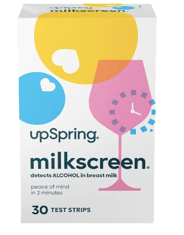Breastfeeding Safely After Alcohol Consumption: Essential Tips and Guidelines


For many new mothers, navigating the complexities of breastfeeding can be challenging, especially when it comes to managing lifestyle choices like consuming alcohol. While abstaining from alcohol is the safest option while breastfeeding, there may be occasions where you choose to have a drink. Here's how you can ensure that you're breastfeeding safely if you decide to consume alcohol.
Understanding Alcohol and Breast Milk
Alcohol passes into your breast milk at concentrations similar to those found in your bloodstream. The amount of alcohol that makes it into your milk is relatively small, but babies have immature livers, making it harder for them to process any amount of alcohol.
Potential Impacts of Alcohol in Breast Milk on Babies:
Disrupted Sleep Patterns: Babies who consume breast milk with alcohol may experience alterations in their sleep cycles, leading to less restful sleep.
Developmental Concerns: Frequent exposure to alcohol through breast milk can potentially affect a baby’s motor development and create delays in the achievement of certain developmental milestones.
Decreased Milk Intake: Alcohol can change the flavor of breast milk, and some babies might consume less if they detect these changes, which can impact their nutrition and growth.
The key to safe breastfeeding after consuming alcohol is timing and moderation.
Tips for Safe Breastfeeding After Drinking Alcohol
1. Plan Ahead
If you plan to drink alcohol, consider breastfeeding your baby or pumping milk before consuming alcohol. This can provide a supply of milk for your baby during the period when alcohol is in your system.
2. Wait Before Breastfeeding
As a general rule, it takes about two hours for an average woman to metabolize one standard drink. Waiting about 2-3 hours per drink before breastfeeding can reduce the alcohol concentration in your breast milk. Use this time to monitor how alcohol affects your body and extend the waiting period if necessary.
3. Moderation is Key
If you choose to drink, do so in moderation. The Centers for Disease Control and Prevention (CDC) suggests that moderate alcohol consumption for women is up to one standard drink per day. This is considered generally safe when breastfeeding, provided you allow adequate time for the alcohol to metabolize before the next feeding.
4. Stay Hydrated
Drinking water alongside your alcoholic beverage can help speed up the elimination of alcohol from your body. Staying hydrated is also essential for maintaining a healthy milk supply.
5. Use Alcohol Test Strips
For peace of mind, consider using products like the Upspring Milkscreen Test Strips to test your breast milk for alcohol. These strips are easy to use and provide a quick indication of whether it's safe to breastfeed.
The Upspring Milkscreen Test Strips have been a game-changer for me as a breastfeeding mother who occasionally enjoys a drink. These strips provide a very quick (within 2 mins) and reliable method to detect any traces of alcohol in my breast milk, giving me peace of mind before feeding my baby. Personally, I find them incredibly helpful, especially when used in conjunction with waiting 2-3 hours per drink to ensure that my body has metabolized the alcohol. This combination of strategies allows me to enjoy social events without worrying about the impact on my breastfeeding routine. Overall, the Upspring Milkscreen Test Strips are an essential part of my responsible breastfeeding plan, making them a valuable tool in maintaining the balance between social life and motherhood.
6. Monitor Your Baby
Observe your baby for any signs of changes in behavior, such as changes in sleeping patterns or developmental milestones, especially if you've consumed alcohol before breastfeeding. If you notice anything concerning, discuss it with your pediatrician.
7. Consult Healthcare Providers
If you're unsure about how to manage alcohol consumption while breastfeeding, or if you find yourself consuming alcohol frequently, talk to a healthcare provider. They can provide guidance tailored to your specific health needs and breastfeeding goals.
Conclusion
While the safest approach is to avoid alcohol while breastfeeding, following these guidelines can help you manage occasional consumption without compromising your baby's health and your breastfeeding journey. Remember that every mother's body metabolizes alcohol differently, so always err on the side of caution and prioritize your baby's safety.
Follow
More tips on self-care, mental well-being, fitness, nutrition, and parenting
Disclaimer
The information provided on this platform is intended for general informational purposes only. It is important to recognize that every baby and mother is unique, and individual circumstances may vary. The advice and recommendations offered here are meant for reference purposes, and should not be considered as a substitute for professional medical advice or personalized guidance.
As an Amazon Associate and affiliate for other brands, I earn from qualifying products.


